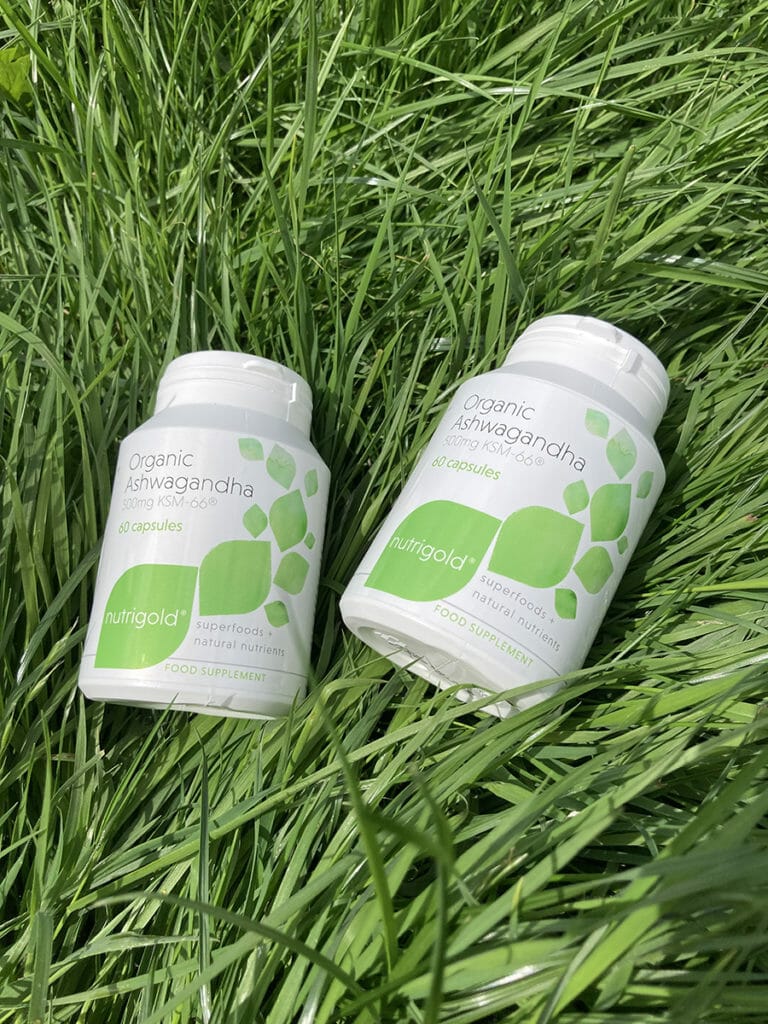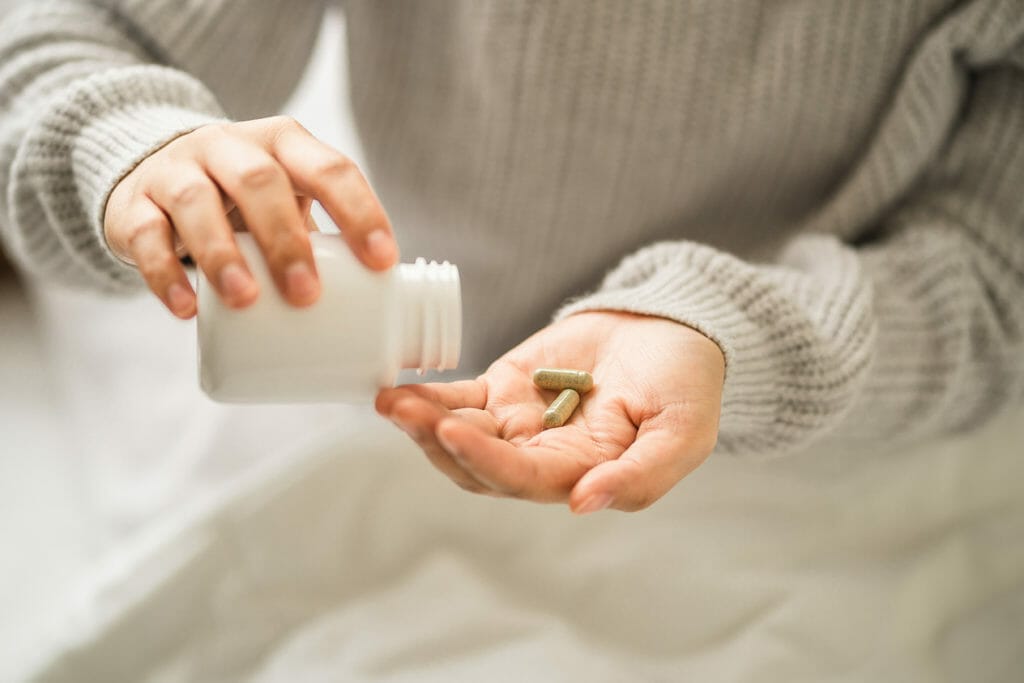The pandemic has increased various stressors in our daily lives. This includes social isolation, economic losses, working from home, and for many people this has also triggered an array of emotional issues.[1]And even though lockdown has been lifted around the UK (for now), emerging into the post COVID-19 era has led to a diverse range of mental health problems, including anxiety, depression, posttraumatic stress disorder (PTSD), and other stress-related disorders.
This diverse and inextricably linked web of psychological symptoms, which are often so difficult to support medically, lends itself to a functional medicine approach. Through which we can use a combination of supporting emotional resilience alongside nutrients that target the bodies systems, which are perturbed when we are feeling anxious or depressed.
And rather than take a symptom-led pharmaceutical approach, there are certain herbs that have been used medicinally for centuries to tackle the systems that become out of balance in psychological conditions such as anxiety, including blood sugar balance and renal function through the HPA (hypothalamic pituitary adrenal) axis.

Ashwagandha
Ashwagandha is that herb you may have heard of but not sure how to pronounce or even spell! Pronounced “Ash-wa-gan-da”, it’s one of the flagship herbs of Ayurveda, the traditional system of medicine from India, and has been used for centuries to reduce stress, increase resilience and resistance to “burn out” and promote a calmer and happier sense of being.[2]
This special herb is packed full of different beneficial phytonutrients including withanolides, which have a similar structure to ginsenosides, the active constituent of Panax ginseng, hence another name for Ashwagandha is “Indian ginseng”. Ashwagandha also contains many more diverse bioactive constituents (including iron, choline, short and long-chain amino acids, fructooligosaccharides, Vitamin A, calcium, flavonoids, glucosides, coumarins and phytosterols) that work synergistically and are believed to be responsible for its multiple therapeutic properties.
Stress, anxiety and adrenal (HPA) support
Ashwagandha can act as a GABA mimetic (the chemical messenger in our brain that helps has to feel calm) and is effective at reducing symptoms of heightened anxiety, stress, as well as boosting focus, resilience and mental well-being. Several double-blind, placebo-controlled studies have been conducted on Ashwagandha detailing its use in anxiety, depression and stress demonstrating an average reduction in serum cortisol levels (a stress hormone) of 28% and a lowering of DASS scores for depression and anxiety of 72% over 8 weeks after taking a special type of Ashwagandha extract called KSM-66.[3],[4]
- A 2000 pre-clinical study suggested that the ashwangdha had a comparable anxiety-reducing effect with lorazepam.[5]
- In a 2019 clinical study , researchers found that taking a daily dose of 500mg of ashwagandha significantly reduced people’s stress levels when compared with a placebo. This included reduced levels of the stress hormone cortisol.[6]
- In another 2019 study in humans, taking 250 mg or 600 mg of ashwagandha daily resulted in lower self-reported stress levels, as well as lower cortisol levels.[7]
Normalising cortisol levels through taking Ashwagandha helps support hypo and hyper-function of the adrenal glands; an area so often impacted by the stresses and pressures of everyday life. This can lead to many different conditions such as depression and anxiety, as well as weight gain and Chronic Fatigue Syndrome (CFS). Blood lipids have also been shown to be normalised by Ashwagandha in stress-related conditions including reduced levels of LDL cholesterol and triglycerides.

Energy, stamina & endurance
Ashwagandha has also been shown to significantly improve energy levels in just 12 weeks as well as improving muscle mass and recovery time in athletes. Not only is this useful for the purposes of exercise, it is also helpful for people who struggle with their energy levels or those with fatigue-related conditions.[8]
Immune-boosting function
Ashwagandha has been shown to improve macrophage function, which in turn increases the body’s immune defences against pathogens and immune-suppressed diseases.

How to take Ashwagandha
Ashwagandha powder has a strong flavour so capsules are a popular form of supplementation to avoid the bitter aftertaste. Many studies for anxiety use around 500mg ashwagandha but the specific strain used makes all the difference to the outcome.
KSM-66 Ashwagandha is an organically grown, branded, full-spectrum extract, with the highest concentration of all major root-only extracts (including 5% withanolides) available on the market today. It is produced using a unique proprietary extraction process, based on “Green Chemistry” principles, without using alcohol or any other chemical solvent.
KSM-66 is an industry leader having been evaluated in 22 “Gold Standard” human clinical trials.
Summary of Ashwagandha Benefits
- An adaptogenic herb that increases resilience and resistance to ‘burn out’.
- Supports the central nervous system, receptors and hormones throughout the body optimising cortisol and mood, as well as blood sugar and blood lipids.
- Suitable from adolescence onwards.
- KSM-66 Ashwagandha extract has high bioactivity and many clinical studies prove its efficacy in a wide range of health conditions
Of course, just taking one food supplement is not going to solve all health problems associated with conditions such as stress, but in combination with lifestyle and dietary changes, Ashwagandha can prove a powerful tool to get you back on an “emotional even keel”.

Dr Elisabeth Philipps PhD BSc (Hons) BSc Nutr Med AFMCP
Dr Elisabeth Philipps is a clinical neuroscientist and functional medicine practitioner, and runs a health consultancy specialising in brain health, the endocannabinoid system and phytocannabinoids including CBD and medicinal cannabis. She regularly presents at conferences and events, and provides expert opinion for the national press, specialist healthcare publications and health companies. You can connect with Elisabeth via:
www.drelisabethphilipps.com | instagram – @drelisabethphilipps | Twitter – @drphilipps | Linked In – Dr Elisabeth Philipps
[1] https://www.psychiatrictimes.com/view/post-covid-stress-disorder-emerging-consequence-global-pandemic
[2] Srivastava et al (2018) Withania somnifera (Ashwagandha): A wonder herb with multiple properties. As J Pharm Pharmacol 4:123-130 Full paper
[3] Sharma et al (2017) Efficacy and Safety of Ashwagandha Root Extract in Subclinical Hypothyroid Patients: A Double-Blind, Randomized Placebo-Controlled Trial. J Alt Comp Med
[4] A prospective, randomized double-blind, placebo-controlled study of safety and efficacy of a high-concentration full-spectrum extract of Ashwagandha root in reducing stress and anxiety in adults. Chandrasekhar, K., Kapoor, J., & Anishetty, S. (2012). Indian journal of psychological medicine, 34(3), 255.
[5] https://www.sciencedirect.com/science/article/abs/pii/S0944711300800306?via%3Dihub
[6] https://www.ncbi.nlm.nih.gov/pmc/articles/PMC6750292/
[7] https://www.ncbi.nlm.nih.gov/pmc/articles/PMC6979308/
[8] Choudhary et al (2015) Efficacy of Ashwagandha (Withania somnifera [L.] Dunal) in improving cardiorespiratory endurance in healthy athletic adults. Ayu 36:63 Full paper







